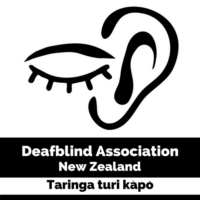Amanda was 24 when she was registered blind. Twenty years later she experienced profound and sudden-onset hearing loss on one side. At the time she was a member of the Blind Foundation and of Blind Citizens New Zealand. She became a committee member of the Nelson Branch of Blind Citizens NZ, was Chair 2015-17, and remains active on that committee. Inspired by the need for advocacy and in support of self-determination for deafblind, blind, and vision-impaired persons, she served on the Blind Citizens NZ Board 2013-17.
Amanda is the Executive Officer for Deafblind Association NZ and is a representative on the Consumer Network Group for the Health Quality Safety Commission, Blind Sector Network Aotearoa, and the Pacific Disability Forum. She also takes a keen interest in the work of World Federation Deafblind and World Blind Union.

“Until I lost my hearing I had no experience of the day-to-day complexity of dual sensory loss. I didn’t even know the term deafblind. I was focused on my work, but the social impact from dual sensory loss was sometimes bewildering and often tiring. A few years later I met some great people who have lived experience of deafblindness and others who work closely with and have an understanding of the needs of our community.”
David Wilson, immediate past Chair of Deafblind Association NZ, is one of those people. Amanda accepted his invitation to work towards forming an organization that would support communication of deafblind and their participation in all aspects of Aotearoa New Zealand life.
“The work I do is about forming healthy relationships while working around the communication needs on the spectrum of dual sensory loss, including NZ Sign, Social Haptics, and Tactile Communication. I love helping people connect and I enjoy creative problem-solving. My aspirations include becoming fluent in NZSL, Te Reo NZSL, and spoke Te Reo Māori.”
Amanda counts team sports as riding her tandem, is a qualified massage therapist, and loves engaging with cultures different to her own, believing that we are more alike than we are different. “It’s how we make participation an active thing and begin to balance the power!”
